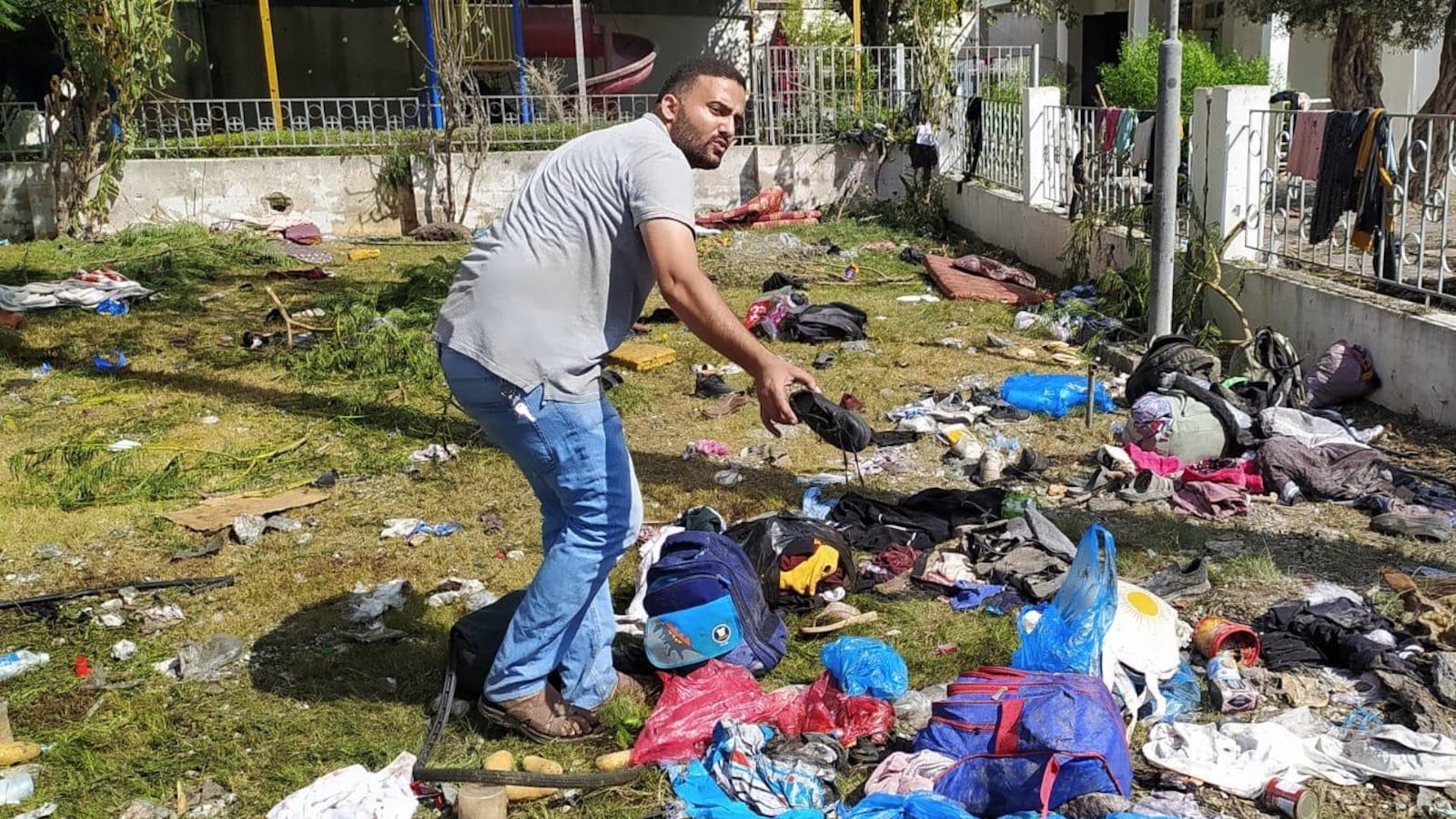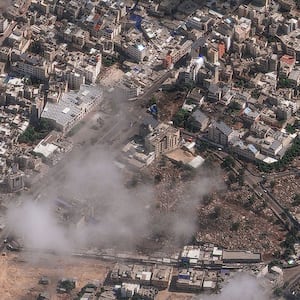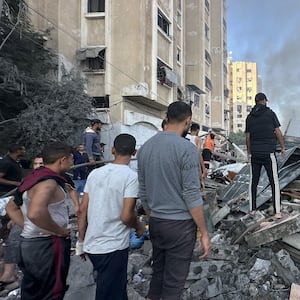GAZA CITY—When a missile struck al-Ahli Ma’madani hospital at around 7 p.m. on Tuesday evening there were hundreds—or possibly thousands—of women and children crowded into the grounds desperately seeking sanctuary from the minute-to-minute horror of endless explosions ripping through the Gaza Strip.
As the sound of the blast echoed through the surrounding streets, Muhammad Qariqi, 31, was among those rushing towards the wall of flames. Two of his aunts and their families had sought refuge within the hospital’s walls.
The morning following the tragic bombing, Qariqi was back at the Anglican-run hospital.
He was still looking for loved ones.
“It was an incredibly harrowing night,” he told The Daily Beast. “We were only able to confirm the fate of four souls from four different families, each comprising at least six members. Our search continues.”
Muhammad Qariqi's family lives in the Shujaiya neighborhood, located near the eastern border of Gaza City. Theirs is an extended family, making it all the more challenging to secure shelter for everyone in times of crisis especially since the schools where Palestinians are taught to hide from Israeli bombs, which are run by the United Nations Relief and Works Agency for Palestine Refugees (UNRWA), are so overcrowded. When their neighborhood was alerted by the Israeli army for evacuation, they headed to the hospital.

A blast struck the hospital grounds on Tuesday evening.
The Daily BeastQariqi’s efforts to find them were hampered by the total devastation at the scene. “The bodies were either charred or torn into pieces,” he said.
After President Biden and U.S. intel sources appeared to back Israel’s claims that the deadly explosion at the hospital was the result of a catastrophic misfire by the Islamist terror group Islamic Jihad rather than an IDF assault, Qariqi was left with questions.
“If the Israeli army attributes this bombing to Islamic Jihad, how is it possible that Jihad's missiles do not result in such a high number of injuries and deaths in Israel? If Jihad possessed such weaponry, Israel would have eliminated them long ago.”
The hospital complex includes a modern public square, with a handful of specialist buildings designated for operations, physical therapy, and even a church. Each two to three story building was left largely intact, but the insides of the structures had borne the brunt of the impact, setting this incident apart from others explosions that have left residential areas and entire families in destitution.
Dr. Fadel Naeem, the head of the orthopedic department at al-Ahli hospital, said they had just finished an operation when the explosion occurred.
“I was getting ready to take a break and prepare for the next surgery, but suddenly a large group of people rushed in. They were screaming and among them were the wounded and the deceased. So, I immediately shifted my focus to providing assistance and saving whoever we could,” he said.
“When I arrived at the hospital in the morning, there were roughly a thousand refugees gathered in the courtyard. By evening, the number had surged into the thousands as the Israeli army issued evacuation calls on their mobiles for the Zaytoun and Shujaiya neighborhoods, prompting more people to seek shelter at our facility.
“I didn't venture out into the hospital yard right away. Many of the wounded lost their lives while we were desperately trying to treat them. When I did step outside, I was confronted by a heart-wrenching scene—a vast number of injured and lifeless bodies strewn across the yard.”

The carpark where hundreds of refugees were sheltering suffered a direct hit.
The Daily BeastNaeem said the hospital’s operations have been temporarily halted. He stressed that urgent renovations were currently underway to swiftly reopen the hospital's doors, as they continue to receive a constant influx of wounded individuals resulting from the relentless, around-the-clock bombing across various areas of Gaza City.
Aed Yaghi, Director of Medical Relief in Gaza, who was at the hospital on the morning of the incident, said he was worried about what would come next: “We fear that this incident may serve as a precursor for further attacks on other hospitals in the Gaza Strip. This hospital played a crucial role in easing the strain on Al-Shifa Hospital and other medical facilities, and targeting it represents a severe blow to the already fragile healthcare sector in the midst of this ongoing conflict.”
The Hamas-run Ministry of Health said the casualty figures were staggering, with 471 fatalities and 314 injuries, including 28 cases classified as critical.
Dr. Ashraf Al-Qudra, the Ministry of Health spokesman, dodged questions from The Daily Beast about whether the Hamas-led authority was carrying out an investigation into the origin of the missile. “The examination of fragments to determine the nature of the explosion is being conducted by competent authorities,” he said, but refused to specify whether any of these fragments had been collected or clarify which Gaza agency would oversee this task.
The blast at the hospital added to grim Hamas statistics that already painted a dire picture: the authorities say a total of 3,478 lives have been lost, 12,065 individuals injured.
The Ministry of Health warned of a critical impending situation, emphasizing the imminent collapse of healthcare services across Gaza. Hospitals are on the brink.
Ahmed Al-Sawafiri, 41, who lives close to the hospital, was in tears at the hospital's entrance.
“In this place, there were displaced individuals, children selling tea, dedicated doctors, and an establishment everyone believed to be a sanctuary,” he said. “Upon hearing the explosion, I rushed to cover the lifeless bodies of women strewn about. I even fetched blankets from within the hospital to aid in collecting the remains of children from the courtyard.
“Where is international law in the face of this tragedy? This is a hospital, not a military training ground.”
Adnan Abu Omar, 45, was en route to the hospital with his family after receiving a warning that there would be strikes on their Zaytoun neighborhood. “As we made our way to the hospital, we were suddenly jolted by a colossal blast, akin to a bomb or a barrel bomb plummeting from the sky. We saw a missile exploded among the refugees.
“We had been heading to Ma’madani Hospital because we knew hospitals were synonymous with safety, but upon our arrival, we were met with a scene of devastation.”
“It was a night from hell, I could barely find my family. We wish for the international community to end these massacres.”







